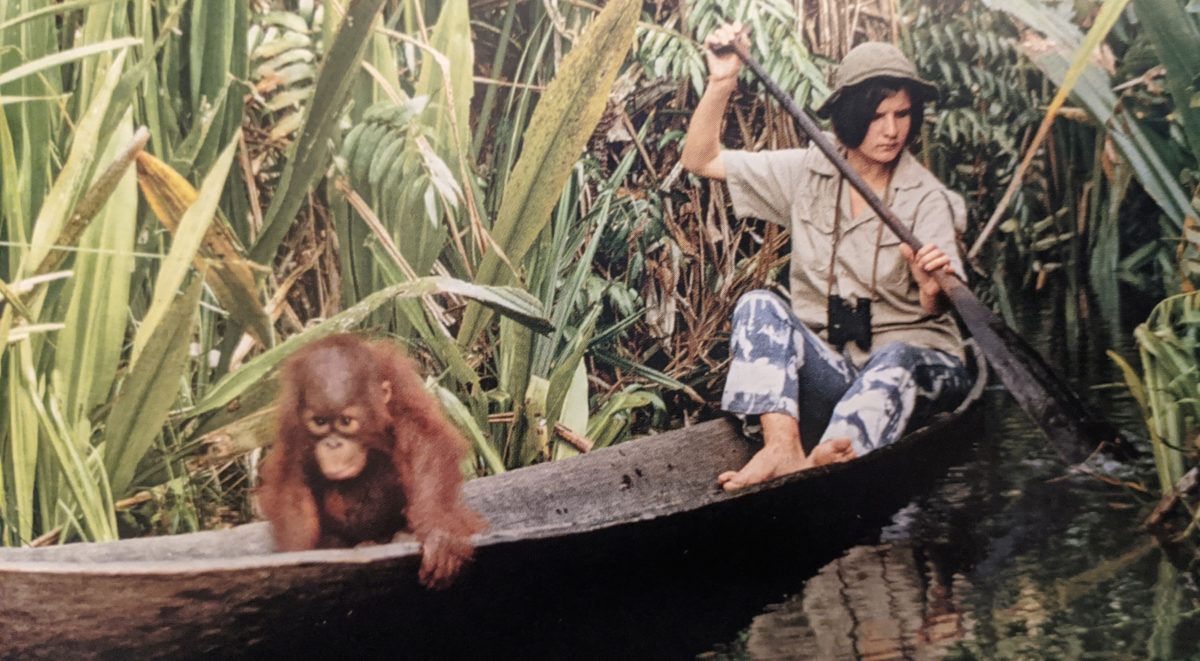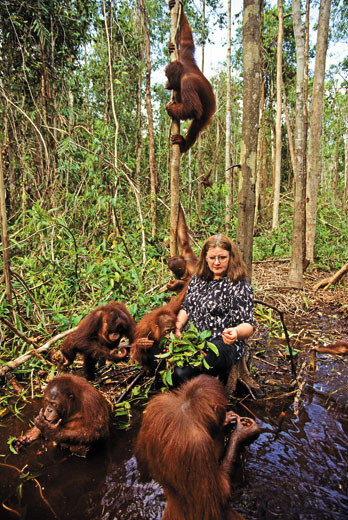Anthropology
Related: About this forumThe Anthropologist Who Has Spent 50 Years Protecting--and Learning From--Orangutans
Biruté Mary Galdikas has quietly fought on the frontlines of some of conservation’s biggest battles.
BY GEMMA TARLACH
MARCH 24, 2022
THE CIGARETTE BUTTS AND PLASTIC wrappers were the first warning signs. The trash, found deep in the rain forest of Southern Borneo’s Tanjung Puting National Park in the late 1990s, was worrisome evidence that a new batch of poachers was on the prowl. Over several decades, the region had been hit by illegal loggers and rampant, unregulated fishing of the endangered Asian arowana, or dragon fish. Slash-and-burn clearing for palm oil plantations and open-pit gold mining continued to bite into the borders of the protected land. Now hunters were targeting orangutans, either to capture them for animal trafficking or simply to kill the primates as an “agricultural pest.”
Biruté Mary Galdikas and her team were ready for them.
As they had when facing past threats, Galdikas and rangers from Orangutan Foundation International (OFI), which she cofounded in 1986, sprang into action, lobbying the government, raising alarms, and forming partnerships with regional police, who were reluctant to venture into the wilderness on their own. Galdikas even led some of the patrols, sometimes sneaking up on poachers’ makeshift shelters in a Zodiac boat powered by a quiet electric motor. Despite some success and continued vigilance, the threat of poaching continues today—as does her resolve. Since her first venture into the field more than 50 years ago, Galdikas has never stopped her work, or her advocacy for the animals and people who call the rain forests home.
In the early 1970s, the media dubbed Galdikas one of “Leakey’s Angels,” a reference to the trio of young women who had secured funding for primate research from famed anthropologist Louis Leakey. Also known as the “Trimates,” the group included Jane Goodall, who went on to fame for her observations of chimpanzees before trading fieldwork for high-profile conservation outreach and environmental activism in the 1980s. The other member of the trio, Dian Fossey, continued her research on mountain gorillas until her murder in 1985. Both women are household names today, but it is the lesser-known Galdikas who may have the greatest impact on primate science and community-forward conservation. Born in Germany to Lithuanian parents, raised in Canada, and educated there and in the United States, Galdikas would find her true home, and her calling, in Borneo.

A female orangutan and her infant move through the forest of Tanjung Puting National Park. RAIYANIM, CC BY-SA 4.0/WIKIMEDIA
More:
https://www.atlasobscura.com/articles/galdikas-orangutan-borneo





Solly Mack
(93,082 posts)wnylib
(24,563 posts)until now. I had seen the film about Dian Fossey, and I have followed Jane Goodall's work ever since I first saw her on the Tonight Show with Johnny Carson.
Our ape cousins are fascinating to me and I am glad to see people studying and protecting them.
I remember when I mentioned Goodall's work in a biology class on human evolution and the similarity between chimp and human DNA. The male professor ridiculed Goodall as "weird" for spending time in the forests to observe chimps. He actually said that it was no way for a woman to live and work. I responded that it did not stop her from having a personal life since she married and had a son while working on her studies. The professor said that was even worse because it was no way for a woman to raise a child.
Not until later did it occur to me that a good response would have been to ask him how far HE had evolved.
Duppers
(28,260 posts)I've read about the orangutans' plight for yrs and have tried to cut my palm oil consumption but it difficult to eliminate because you'll find it in so many processed foods and products.
At least I read labels and try.
Destroying the rainforest is destroying these beautiful, peaceful, intelligent primates. And the products we consume and use is doing it.
It's just simple: humans are destroying wild spieces on the planet. We are mostly oblivious to this and worse, we are uncaring. Just read the vicious attacks on anyone saying we're over-populating the planet.
Biruté Mary Galdikas is a heroine.
Harvesting Palm Oil is Destroying the Rainforests - Scientific American
Today palm oil production is the largest cause of deforestation in Indonesia and other equatorial countries with dwindling expanses of tropical rainforest.
https://www.scientificamerican.com/article/harvesting-palm-oil-and-rainforests/